#school abolition
Text
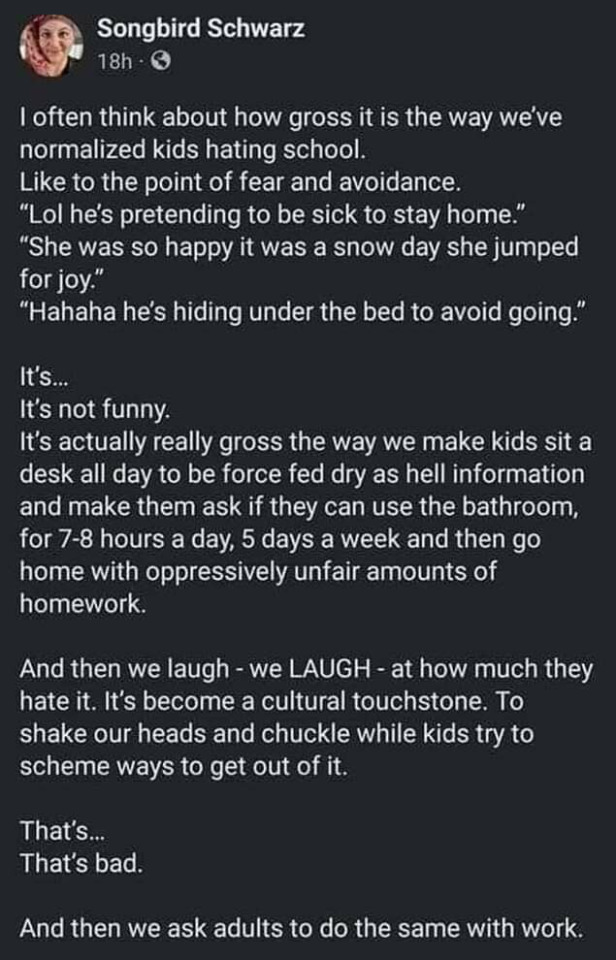
[image ID: Facebook post by Songbird Schwarz
I often think about how gross it is the way we’ve normalized kids hating school.
Like to the point of fear and avoidance.
“Lol he’s pretending to be sick to stay home.”
“She was so happy it was a snow day she jumped for joy.”
“Hahaha he’s hiding under the bed to avoid going.”
It’s...
It’s not funny.
It’s actually really gross the way we make kids sit a desk all day to be force fed dry as hell information and make them ask if they can use the bathroom, for 7-8 hours a day. 5 days a week and then go home with oppressively unfair amounts of homework.
And then we laugh - we LAUGH - at how much they hate it. It’s become a cultural touchstone. To shake our heads and chuckle while kids try to scheme ways to get out of it.
That’s…
That’s bad.
And then we ask adults to do the same with work.
/end image ID]
#repost of someone else’s content#facebook repost#child abuse cw#ageism#adultism#child abuse#anti school#anti capitalism#school abolition#youth rights#youthlib#youth liberation#(I think the connection—designed to train for tolerating workplace abuse—was made explicitly in its original formation?#don’t quote me on that though)
3K notes
·
View notes
Text
youth liberation includes school abolition, but ridding the world of public schools does not in itself advance the cause of youth liberation
136 notes
·
View notes
Text
I don’t know who need to hear this.
but if highschool, college, university, or just anything like that is stressing you out to the point of suicidal thoughts and tendencies
you just have to quit, there’s nothing wrong with it.
your life is worth so much more than stupid grades or a degree.
for all the people in highschool who were always told “if you don’t do high school you will never get into college/university” I’m so fucking sorry but those people were lying their fucking asses off.
you don’t need a highschool education to get into shit, hell it’s mostly about the money. Knowledge is awesome and valuable but it’s not worth killing yourself for.
don’t burn out in highschool literally this is not even a fucking joke it DOES NOT MATTER fuck highschool.
grades are a sham, the education system is flawed as hell, and your life IS WORTH MORE THAN A 100%/A+
your life is worth so much more than that, grades don’t matter you’ll hurt yourself so much if you keep thinking that.
you can homeschool, you can become a apprentice, you can learn well anything you want online now! You can call up a local science teacher and ask them to tutor you, HELL! do whatever it takes to keep your life and your love for knowledge.
school sucks, I know too many people to say otherwise. Your feelings are valid you ARE NOT A FAILURE for not doing amazing at your homework or at school fuck anyone who says that!
genuinely those fuckers don’t know shit about anything, learning is mistakes and failures and learning FROM IT if you never got a chance to try again how is it your fault you didn’t improve?
don’t kill yourself over school that is such a stupid thing to do, you can quit school and still get a education!!!! people just want you to stay in school and get abused and stressed to death.
I taught myself so much, because the current ways we teach people fucking sucks ass.
remember the grades and numbers and all that shit does not matter, what matters is that you love learning things and you keep learning.
I will fucking slap you dead ass in the face if you say anything more, if your family is abusive and you have to be a high achiever? WELL still don’t fucking kill yourself over their dumb fuck obsession with you being “good at school” there’s no such thing as winning and losing at learning!!!!!!!!
THERE IS NO SUCH THING AS WINNING OR LOSING IN LEARNING!
genuinely there’s no such thing! You just don’t get it the first time! But learning and education is about love for knowledge it’s about kindness and respect it’s about finding new things it’s about being happy and knowing things you never did before!
it’s not about you “failing” it’s about learning that’s fucking it.
don’t kill yourself over the modern education system take fucking strikes, advocate for no time limits, advocate for better mental healthcare, advocate and SCREAM protest against it all.
your life is worth living, your life is beautiful and you have done everything to deserve it, you are someone is is worth something, and I will listen and we will fight.
you will get to the next day you will get to the next one after that you will live happily even if you think it’s impossible.
you will and you will love you will cry and you will see and dream and live a life YOU want.
abolish school, and we will make a new system that isn’t fucking what it was!
you are worth so much more than grades and papers, so don’t think so hard about it. You are you and you are worth it <3
-sincerely your local suicidal fucker
#-pop#mental health stuff#disability#anticapitalism stuff#activism stuff#anarchism stuff#trans stuff#queer stuff#school abolition#school abuse#school#university#high school#highschool#college#students#teacher#the education system#Hopepunk#reminders
154 notes
·
View notes
Text
Abolish School, Destroy Civilization
an anti-civ guide to school abolition, family abolition, and youth liberation
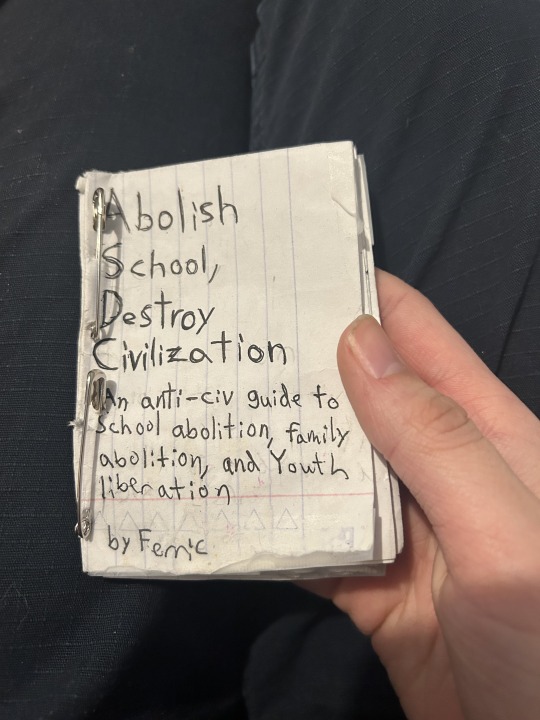
so yeah i finally finished a project for once in my life
it’s a neat little zine on school abolition
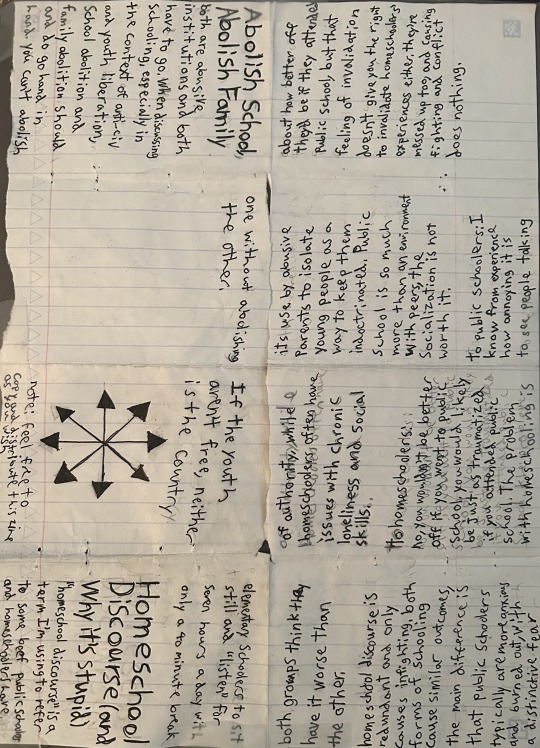

(here are both parts of it unfolded in case anyone wants to copy this and put it places)
#post left#anti civ#anti school#school abolition#family abolition#youthlib#youth liberation#zines#anarchist zines#zinester
57 notes
·
View notes
Text

Everyone who has ever been to school knows that school is prison, but almost nobody beyond school age says it is.
It's not polite. We all tiptoe around the truth because admitting it would make us seem cruel and would point a finger at well-intentioned people doing what they believe to be essential.
A prison, according to the common, general definition, is any place of involuntary confinement and restriction of liberty. In school, as in adult prisons, the inmates are told exactly what they must do and are punished for failure to comply.
Actually, students in school must spend more time doing exactly what they are told than is true of adults in penal institutions. Another difference, of course, is that we put adults in prison because they have committed a crime, while we put children in school because of their age.
— Peter O Gray, Free to Learn: Why Unleashing the Instinct to Play Will Make Our Children Happier, More Self-Reliant, and Better Students for Life
62 notes
·
View notes
Text
Those who talk about wishing they went to public school are talking about wishing they weren’t abused and isolated by their parents.
Childhood&adolescence socialization does not only exist in school. Your parents have purposefully isolated you from your peers not just by homeschooling you.
Protection from abuse must exist for every situation, and school would not have saved you from abuse. If it did, infinitely less of those who go/went to public school would be/have been also abused by their parents — as well as by their teachers (and other staff) and other students.
Systems of power are the problem, including, at the core, that of the family — and school is a system of power too.
And. There. Are. Always. Those. Who are too disabled for public school.
#leviathan.txt#leviathan argues#school abolition#homeschooling discourse#abolish both school and family#adultism#adult supremacy#child abuse#parental abuse#school abuse#youth liberation#umbrella tag: age
51 notes
·
View notes
Text

the new minecraft texture pack is so 𐀂𐀚𐀀 𐀪 𐀂 h𐀁 𐀂 𐀀𐀁𐀁 𐀂𐀴𐀁 𐀃𐀁 𐀩𐀁 𐀀𐀄𐀀𐀁. I 𐀂 𐀀 yll𐀀c c𐀪 𐀄𐀮 𐀂 v𐀀𐀪𐀃𐀄 l𐀀s 𐀀ll 𐀃v𐀁 G𐀩𐀁 𐀉𐀪g h𐀁 ya𐀁𐀀 𐀟𐀪𐀃. A𐀗g h𐀁 l𐀀s 𐀀𐀩 Pyl𐀃, Tee, Il𐁁𐀙, El𐀁𐀄𐀯 𐀀d K𐀜s𐀃.
Ti 𐀸s𐀂𐀳 𐀃ff𐀁s 𐀀 𐀵𐀃l f𐀃 r𐀀sl𐀂𐀳𐀨𐀴g l𐀀𐀴 c𐀪 𐀵 L𐀂𐀚𐀀 B 𐀀d v𐀂 v𐀁s𐀀. Ev𐀁 yll𐀀l𐀁 or𐀁p𐀃d 𐀵 𐀀 yll𐀀g𐀨 𐀀 𐀃𐀚 n 𐀮𐀁 𐀂 h𐀁 𐀲l𐀁 el𐀃. F𐀄tem𐀃𐀩, 𐀝b𐀁s 𐀀𐀩 𐀀l𐀰 r𐀀sl𐀂𐀳𐀨𐀳: 𐀁.g. 𐀵 g𐀁 𐄋𐄋𐄋𐄋𐄋 𐀂 L𐀂𐀚𐀀 B, y𐀃𐀄 𐁀v𐀁 𐀵 f𐀂s r𐀂𐀳 𐄯, h𐀁 𐄦 𐀀d 𐀰 𐀃, 𐀂.𐀁. 𐄯𐄦𐄝𐄔𐄋.
H𐀁𐀩, y𐀃𐀄 𐀔y f𐀂d 𐀀 𐀂p𐀄 𐀕h𐀃 f𐀃 L𐀂𐀚𐀀 B 𐀃 L𐀂𐀝x.
#minecraft#196#procedurally generated shitpost#gender anarchy#pixel art#trans memes#anarchy#traaaaaaannnnnnnnnns#prequel memes#sports abolition#school abolition#minecraft texture pack
26 notes
·
View notes
Text
In our society, it is completely normal that an entire population of people are legally mandated to clock in for about 30 hours of work a week on top of several hours of at home work, completely uncompensated, and are disregarded as unruly, ungrateful and lazy when they object. That population is children.
We need to start seeing school as labour.
Education does not require coercion.
10 notes
·
View notes
Note
what's the idea behind coercion not being ipso facto bad? how does this apply to the abolish schools discourse?
first off have to bracket this by saying i've never discussed coercion at length, because it doesn't tend to be used particularly formally, and because i'm allergic to the cats in the narko squat. but, to the point: there's no big idea behind it. that's just it—if you want to claim something is ipso facto bad, you have to do the moral legwork there; you have to own the edge cases. when you don't do this, you really mean something like 'X phenomenon in many cases causes Y phenomenon, where i find Y bad'. in the case of coercion, people don't tend to explain why it's bad very seriously, because it doesn't actually make any sense to claim that something ipso facto bad becomes un-bad when it's, like, legitimated through some procedure, and attempting to redraw the lines such that it’s only coercion when not legitimated in this fashion stretches credulity. but on the other hand nearly all of us are comfortable with *some* uses; we just try to bracket them in a way which makes them appear non-problematic.
a clearer example of what i’m talking about with more straightforward ramifications would be domination, because we can pick out a more definitive account to consider. we can basically read it as the capacity to affect the choice set of another party; at first blush this makes sense & leads us towards an account of freedom. the trouble is that i’m always in-principle in the position to affect the choice set of a third party, because even something as basic as a market transaction affects something like supply or price in a fashion that renders the choice fundamentally different. the ability to buy something at a dollar and the ability to buy something at a dollar and a penny are different choices, as is the ability to access a good for which one has to queue at t=1 or t=2. but, we don’t even have the conceptual capacity to talk about what it would mean for agents to only make ramification-less choices in this way. it’s ultimately purely specious. the classic example in the literature is that refusing to let a neighbour without a pool use your pool at odd hours of the day is dominating them, but if anything this undersells how badly domination overgeneralises.
i understand coercion and domination aren’t precisely the same, but they’ve been read together by domination theorists to the point where you can appreciate how applying force to change the calculus of the choices before someone is once again a species of this sort of power-over.
the overall way in which to situate my lack of care for concepts of coercion etc., though, comes in the fact i don’t think personal identity or metaphysical conceptions of the subject hold water, & so i find most conceits of autonomy & so on fall apart in much the same way. i’m not a rights-thinker, or a contract-thinker, or a duty-thinker, or other species of liberal.
it’s a neat question how that squares with the abolition of schools, because i do have the sort of gut moral sentiments that seem to comport with this philosophical position fairly awkwardly, though. another example that came to mind recently was my profound distaste for the whole voluntary-death moral panic. ultimately i do think it’s possible to square the circle, but it requires a deeper ethical sketch than i have space for here. to take a very quick stab: when we don’t find ourselves possessed of the idea that moral facts are out there to be discovered by clever metaphysicians, we’re forced to, well, ask questions, and make our peace with using language to do so. in other words, we listen! this is something that perfectionisms, whether of the hedonistic-utilitarian or aristotelian bent, do not.
my scepticism towards schools, aside from sheer horror at the idea of telling someone how i want to dispose of the next ten years of their life, is a scepticism towards knowing what kind of person you ought to develop into. i can help you develop into the kind of person that would bring you satisfaction, and i can tell you the requirements of those rules, but i would never presume to you know your good. because ultimately the aggregate social good i’m looking for comprise, along with everyone else’s, your evaluation of your life as a whole anyway!
52 notes
·
View notes
Text
You discovered school abolition through some obscure French philosopher I discovered school abolition by listening to the wall on repeat in class
We are not the same
3 notes
·
View notes
Text
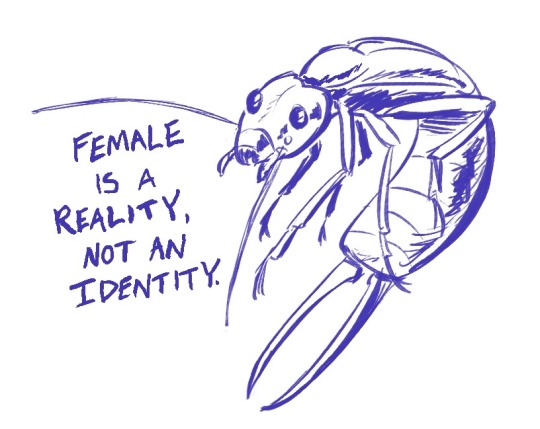
little earwig doodle to celebrate my new drawing tablet 🥳
#radfem safe#radical feminism#gender abolition#radfems please touch#getting used to all the BUTTONS AND DIALS HAHAA#i was using my shit ass wacom from high school all through college until now this is great#getting used to the different workflow and still have to make some adjustments but i'm quite happy with it#there will be more art very soon#art#mine
349 notes
·
View notes
Text
https://twitter.com/butchanarchy/status/1663942855746895875
Schools are sites of extreme social control and abuse, serve as state propaganda distribution centers, and are by and large focused on creating docile servants to capital rather than inquisitive learners. School abolition is a necessary radical demand.
If you got through the experience of schooling with your love of learning and self-esteem intact I’m honestly very happy for you but that is not reflective of how many youth experience school as an institution. Reach beyond your own experiences in your analysis please.
The idea that children can’t and won’t learn unless they are under power of centralized authority has the same roots as the belief that no one would ever labor if not under the coercive control of the state and capital. It’s a myth to justify control and domination.
If you find yourself scoffing at the idea of school abolition I hope you will see that reaction for what it is: a defense of something you have always been taught to see as natural and inevitable. As a radical such a reaction calls for analysis, not dogmatic acceptance.
Liberalism has taught many that politics need only ever be in reaction to what conservatives are doing. Right-wingers attack the institution of schooling? This must mean School = Good and that any critique of schooling = conservative. Radical politics require we step beyond this.
Teenage suicide rates fell when much of school turned to remote learning, and they rose again (by 18%!) when in-person schooling resumed. This is not an institution that needs your defense. It is an institution that inflicts frankly incalculable levels of trauma on youth.
Let’s go even further than just critique the authoritarian institution of school, keep digging up the roots! What would happen if we opened ourselves up to inquiring about the values laden in the conceptualization that education is something that can be “given” Teacher ➡️ Student
Let’s analyze the idea that the Teacher is someone who is Already in possession of Knowledge, who then pours that Knowledge into the Passive Vessel of the Student, who has no Knowledge. Is this the only way learning happens? Is it really the best way?
What other lessons are we teaching youth when we accept the above as true? What are they learning about their own worth, what about themselves and their learning process are they being taught to ignore and suppress because it does not align with the processes dictated by Teacher?
What wounds do we ourselves still carry by being taught in this way? Did this process teach us how to explore, how to be creative, how to drive our own learning process forward without the dictates of an Authority figure? How do we see these wounds reflected in our peers?
And what lessons are we missing out on when we believe that youth are simply receptacles of Adult Wisdom? When we devalue their agency so much as to outright deny its existence in our defense on institutions that control them? Could they not also be our teachers?
The beauty of radical politics is that they reveal that all forms of social relations are vulnerable to critique. Social structures are choices, not states of nature we cannot help but reproduce. We can keep digging, keep questioning. imo it is a moral imperative that we do so.
There are always more questions to ask! There are always more options for exploration than we are presented by authoritarian hegemony. That many of us are not accustomed to analyzing and exploring this way is, itself, a symptom of how our society approaches learning.
#repost of someone else’s content#twitter repost#butchanarchy#hierarchy#ageism#adultism#adult supremacy#childism#education#pedagogy#school#anti school#school abolition#youth rights#youthlib#youth liberation#anarchism
120 notes
·
View notes
Text
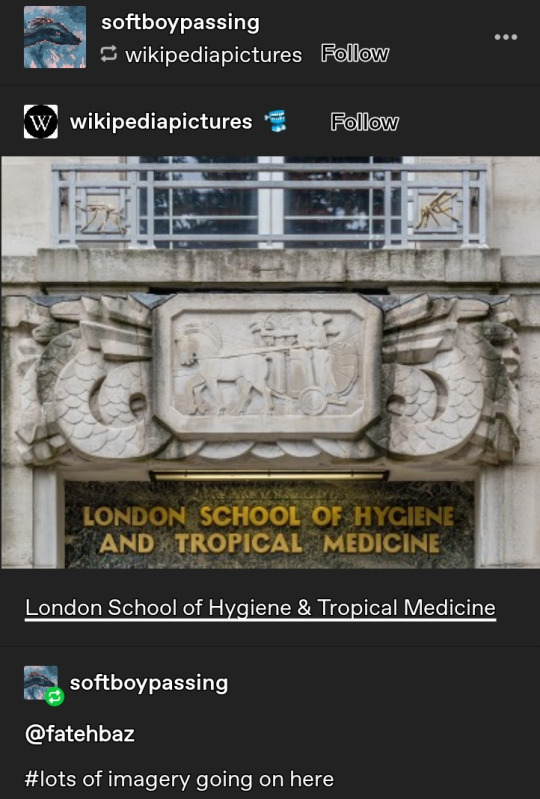
"defending civilization against bugs"
lol the mosquito sculpture
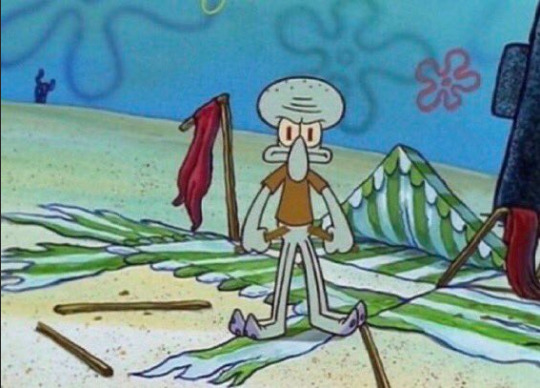
---
Sir Ronald Ross had just returned from an expedition to Sierra Leone. The British doctor had been leading efforts to tackle the malaria that so often killed English colonists in the country, and in December 1899 he gave a lecture to the Liverpool Chamber of Commerce [...]. [H]e argued that "in the coming century, the success of imperialism will depend largely upon success with the microscope."
Text by: Rohan Deb Roy. "Decolonise science - time to end another imperial era." The Conversation. 5 April 2018.
---
[A]s [...] Diane Nelson explains: The creation of transportation infrastructure such as canals and railroads, the deployment of armies, and the clearing of ground to plant tropical products all had to confront [...] microbial resistance. The French, British, and US raced to find a cure for malaria [...]. One French colonial official complained in 1908: “fever and dysentery are the ‘generals’ that defend hot countries against our incursions and prevent us from replacing the aborigines that we have to make use of.” [...] [T]ropical medicine was assigned the role of a “counterinsurgent field.” [...] [T]he discovery of mosquitoes as malaria and yellow fever carriers reawakened long-cherished plans such as the construction of the Panama Canal (1904–1914) [...]. In 1916, the director of the US Bureau of Entomology and longtime general secretary of the American Association for the Advancement of Science rejoiced at this success as “an object lesson for the sanitarians of the world” -- it demonstrated “that it is possible for the white race to live healthfully in the tropics.” As Timothy Mitchell writes: “In 1915, the year after the canal’s completion, the newly established Rockefeller Foundation took over the mosquito campaign from the U.S. Army and launched a worldwide program" [...]. The [...] measures to combat dangerous diseases always had the collateral benefit of social pacification. In 1918, George Vincent, president of the Rockefeller Foundation, candidly declared: “For purposes of placating primitive and suspicious peoples, medicine has some decided advantages over machine guns." The construction of the Panama Canal [...] advanced the military expansion of the United States in the Caribbean.
Text by: Fahim Amir. "Cloudy Swords." e-flux Journal Issue #115. February 2021.
---
Richard P. Strong [had been] recently appointed director of Harvard’s new Department of Tropical Medicine [...]. In 1914, just one year after the creation of Harvard’s Department of Tropical Medicine, Strong took on an additional assignment that cemented the ties between his department and American business interests abroad. As newly appointed director of the Laboratories of the Hospitals and of Research Work of United Fruit Company, he set sail in July 1914 to United Fruit plantations in Cuba, Guatemala, Honduras, Costa Rica, and Panama. […] As a shareholder in two British rubber plantations, [...] Strong approached Harvey Firestone, chief executive of the tire and rubber-processing conglomerate that bore his name, in December 1925 with a proposal to conduct an extensive biological and medical survey of the interior region of Liberia. Strong found a receptive ear. Firestone had negotiated tentative agreements in 1925 with the Liberian government for [...] a 99-year concession to optionally lease up to a million acres of Liberian land for rubber plantations. [...]
Nearly all of the [Harvard tropical medicine] department’s expeditions were to industrial plantations in the making. […] [I]nfluenced by the recommendations and financial backing of Harvard alumni such as Philippine governor Gen. William Cameron Forbes and patrons such as Edward Atkins, who were making their wealth in the banana and sugarcane industries, Harvard hired Strong, then head of the Philippine Bureau of Science’s Biological Laboratory, and personal physician to Forbes, to establish the second Department of Tropical Medicine in the United States [...].
Strong and Forbes both left Manila for Boston in 1913. Strong began assembling a team of researchers and a course of instruction to take advantage of the increasing overseas presence of US firms. Forbes became an overseer to Harvard University and a director of United Fruit Company, the agricultural products marketing conglomerate best known for its extensive holdings of banana plantations throughout Central America. […] In 1912 United Fruit controlled over 300,000 acres of land in the tropics [...] and a ready supply of [...] samples taken from the company’s hospitals and surrounding plantations, Strong boasted that no “tropical school of medicine in the world … had such an asset.” “It is something of a victory for Harvard,” he argued. “We could not for a million dollars procure such advantages.”
Over the next two decades, he established a research funding model reliant on the medical and biological services the Harvard department could provide US-based multinational firms in enhancing their overseas production and trade in coffee, bananas, rubber, oil, and other tropical commodities. [...] As the expedition set sail for Monrovia, Strong wrote in his diary that he hoped their efforts would push the United States to “exert a more stimulating influence upon the development of the … country and its people” as it had in the Philippines, Panama, and Puerto Rico. [...] Harvard’s Department of Tropical Medicine was thoroughly entangled in the material relationships – transportation infrastructure, labor regimes, and commodity production – that were instrumental in advancing the interests of firms like United Fruit, Firestone Tire and Rubber Company, and the American Chicle Company as they transformed landscapes across the globe.
Text by: Gregg Mitman. "Forgotten Paths of Empire: Ecology, Disease, and Commerce in the Making of Liberia's Plantation Economy." Environmental History Volume 22 Number 1. January 2017.
#literally that post i made earlier today about frustration of seeing the same colonial institutions and leaders showing up in every story#about plantations and forced labor my first draft i explicitly mentioned the harvard school tropical medicine and kew royal botanic garden#abolition#ecology#imperial#colonial#bugs
80 notes
·
View notes
Text
By W.E.B. Du Bois
How the facts of American history have in the last half century been falsified because the nation was ashamed. What are American children taught today about Reconstruction? . . . they would in all probability complete their education without any idea of the part which the black race has played in America; of the tremendous moral problem of abolition; of the cause and meaning of the Civil War and the relation which Reconstruction had to democratic government and the labor movement today . . .
#Juneteenth#Reconstruction#Black history#WEB Dubois#slavery#abolition#propaganda#white supremacy#capitalism#civil war#Black liberation#workers#solidarity#education#schools#struggle la lucha
81 notes
·
View notes
Text
school is child abuse <3
#ferric says stuff but fancy#anti school#school abolition#school abuse#institutional abuse#child abuse tw#abuse tw#anti civ#post left#youth liberation#youthlib
28 notes
·
View notes
Text
“Education should be enforced for everyone because there are people who can’t access education” = “everyone should be force-fed because there are people who are starving”
24 notes
·
View notes